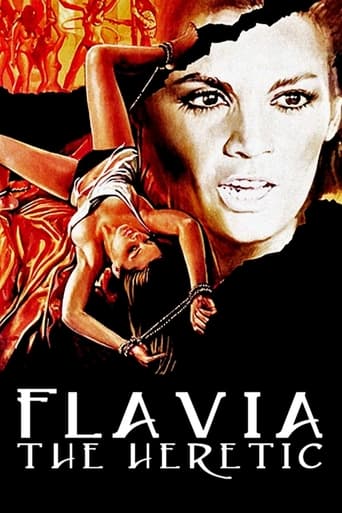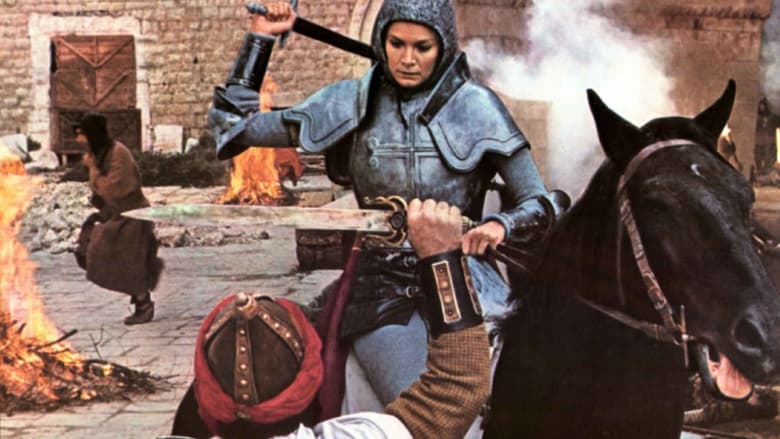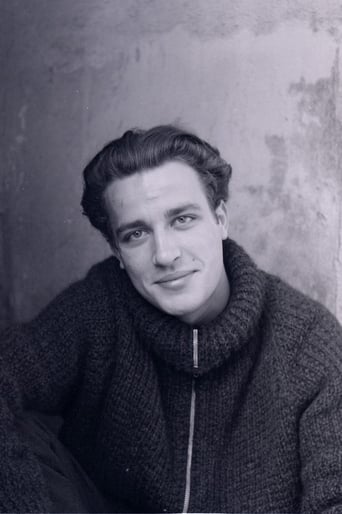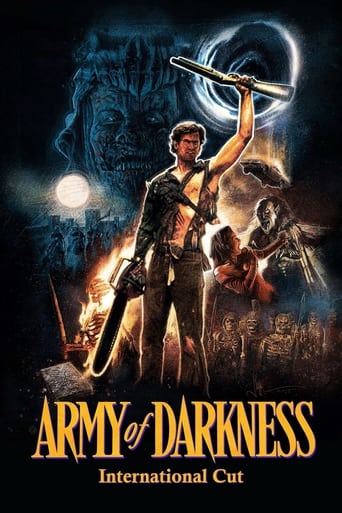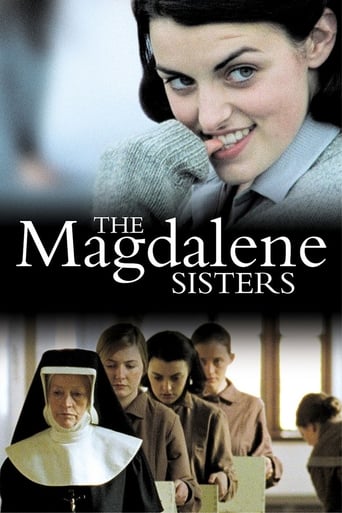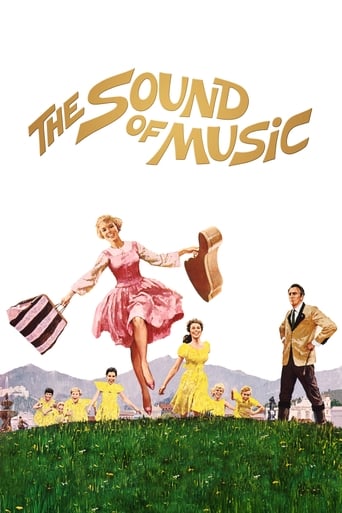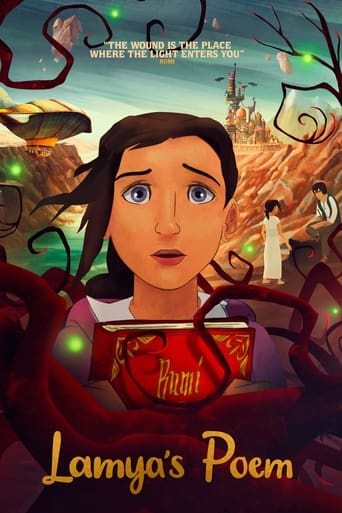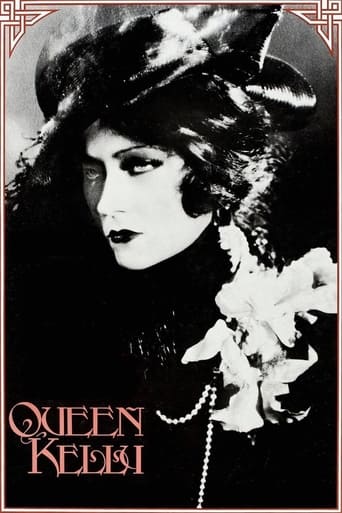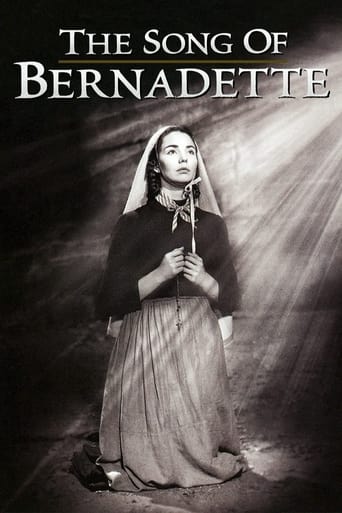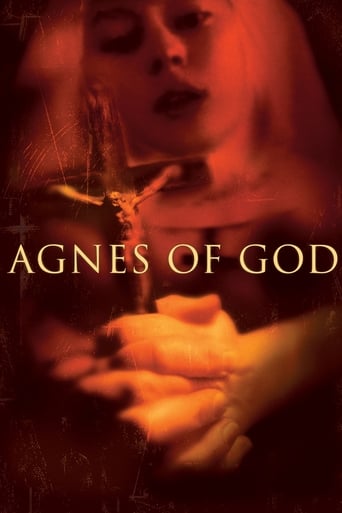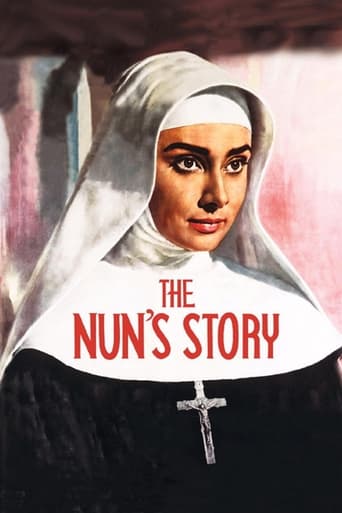Flavia the Heretic (1977)
Puglia, southern Italy, around 1400. A convent is invaded by the Tarantula cult, whose fanatical and crazed members desecrate the sacred place by committing obscene and bloody acts.
Watch Trailer
Free Trial Channels
Cast


Similar titles
Reviews
This is How Movies Should Be Made
At first rather annoying in its heavy emphasis on reenactments, this movie ultimately proves fascinating, simply because the complicated, highly dramatic tale it tells still almost defies belief.
The best films of this genre always show a path and provide a takeaway for being a better person.
It is encouraging that the film ends so strongly.Otherwise, it wouldn't have been a particularly memorable film
A young woman is sent to a nunnery by her domineering father in 15th century southern Italy, while there she is subject and witness to many atrocities. She later flees and becomes the lover of the leader of an invading Muslim army and with his muscle underpinning her; she enacts grisly revenge on those who have wronged her.Flavia the Heretic is one of the prime examples of the sub-genre known as nunsploitation. Along with The Devils (1971), it combines some serious drama along with gruesome exploitative material. Although it could be argued that in both of these films the nasty scenes are pretty necessary in reflecting the grimness of their respective stories. Both films look at the dubious actions of the church in the middle ages but Flavia more specifically has a feminist outlook as well and considers the role of women at that time. Consequently, this is an unusually serious minded bit of nunsploitation. It is considerably helped in this regard by a standout turn from the always impressive Florinda Bolkan in the lead role. She essays the emotional story arc of Flavia quite expertly and certainly elevates the drama of the story. This is a very interesting central female character of a type you don't see very often leading a movie, especially in a film of this type.In regards to the more visceral aspects, there were a few very grim scenes of torture and graphic excess, including a borderline unwatchable castration of a horse and a gruesome climax. Some of the horrible scenes have a definite overall point though, such as a sequence where a rich and decadent duke rapes a servant girl in a pig sty. It's a scene that illustrates the way that women were treated like animals by the ruling classes who were at liberty to act as they saw fit. On the whole, Flavia the Heretic is an Italian genre film with a more art-house sensibility than was typical. It provides both vicarious thrills and something to actually think about. And that's not a bad achievement really.
Post-feminist depiction of cruelty and sadism.Spoiler alert! This underrated gem of a film tells the story of Flavia, a Fifteenth Century girl of Noble birth walled up in a convent after defining her father and indeed the whole of Medieval Christian society by viewing a fallen Islamic warrior as a human rather than demonic figure.Unable to accept the patriarchal rule of the convent (explicitly stated in a scene where the Bishop arrives flanked by soldiers and monks) Flavia begins to explicitly question the society in which she finds herself and, through butting up against a whole system of subjugation, repression and violence, inevitably brings a tragic end not only to herself but all those around her.Billed as a piece of nunsploitation this is far from the truth. This is a film depiction the consequences of violence, the effects of patriarchal dominance, the nature of rebellion and the corruption of the human spirit.I described it in the title of this piece as 'post-feminist' and in the end Flavia's triumphs must always be corrupted, compromised and perverted by men. Even Flavia's gruesome end is perpetrated by men for men (the women turn away and only the monks look on without horror.As to the much discussed violence: this is a depiction of the effects of violence and the horrors of a world driven mad by religious excess. To have shied away from the violence would have limited the film's impact, would have cheapened the film and allowed it to be assimilated within the Patriarchal discourse it is exposing. In addition it is a realistic portrait of medieval society.Beautifully filmed, brilliantly acted (notably by Florinda Bolkin and Maria Casares), containing a wonderful score by piovani and still challenging after all these years Flavia is a classic of European Cinema.
There is so much that can be said about this film. It is not your typical nunsploitation. Of course, there is nudity and sex with nuns, but that is almost incidental to the story.It is set in 15th Century Italy, at the time of the martyrdom of 800 Christians at Otranto. The battle between the Muslims and the Christians takes up a good part of the film. It was interesting when everyone was running from the Muslim hoards, that the mother superior would ask, "Why do you fear the Muslims,; they will not do anything that the Christians have done to you?" Certainly, there was enough torture on both sides.Sister Flavia (Florinda Bolkan) is sent to a convent for defying her father. In the process, she witnesses and endures many things: the gelding of a stallion, the rape of a local woman by a new Duke, the torture of a nun who was overcome during a visit by the Tarantula Sect, and a whipping herself when she ran off with a Jew. The torture was particularly gruesome with hot wax being poured on the nun, and her nipples cut off.Sister Flavia is bound to continue to get into trouble as she questions the male-dominated society in which she lives. She even asks Jesus, why the father, son and holy ghost are all men.Eventually, she joins the leader of the Muslims as his lover and they sack the convent. Here is where you see more flesh than you can possible enjoy at one time. But, tragedy is to come. She manages to exact sweet revenge on all, including the Duke and her father, but finds that the Muslim lover treats her exactly the same. She is a woman and that is all there is to it.I won't describe what the holy men of the church did to this heretic at the end, but it predates the torture of Saw or Hostel by decades.Nunsploitation fans will be satisfied with the treats, but movie lovers will find plenty of meat to digest.
Flavia the Heretic is an undeniable work of art and probably my number one recommendation to state that the euro-exploitation cinema is severely underrated and not to be ignored. This is an intelligent and complex film, beautifully realized and surprise pretty damn accurate! This is more than just meaningless sleaze or gratuitous violence and it's about time those prudish film committees who categorize Flavia as forbidden trash reckon this as well. Flavia is a beautiful 14th century adolescent, forced to live the life of an obedient nun in a strict convent. She refuses to accept her being inferior just because she's female and she curses her fellow sister for being so tolerant about this. After a fruitless attempt to escape, she befriends another rebellious nun and she even guides a troop of bloodthirsty Muslims into the walls of the convent.Flavia is a downright mesmerizing film! Almost impossible to believe that director Gianfranco Mingozzi managed to make it appear so realistic and so disturbing. I challenge you to come up with a title that centers on the topic of pioneer-feminism more intensely than Flavia does. Several sequences are quite shocking (on the verge of nightmarish, actually) as the camera zooms in on brutal rapes, torture and mutilation. Yet all this raw footage isn't just used to satisfy perverted gorehounds, mind you. I'm strongly convinced that they're part of the statement 'Flavia' is trying to communicate: Humanity (the Catholic Church in particular) historically proved itself to be a hypocrite and discriminating race and there's no use in denying it any further. Films like "Flavia, the Heretic" have the courage to question and openly condemn our precious ancestors and I truly admire them for it. Flavia is an outstanding and fundamental exploitation film because of its substance, but it's even brought to an higher level by the wondrous cinematography, the glorious costumes & scenery and a breathtaking musical score by Nicola Piovani. Florinda Bolkin is very convincing as the ambitious and headstrong nun but it's María Casares who steals the show as Sister Agatha. She's a man-hating and loud-mouthed nun who likes to urinate in the open field! Amen, sister!

